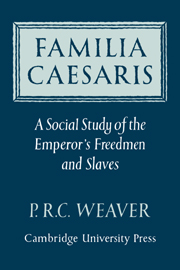3 - Status indication
Published online by Cambridge University Press: 07 October 2011
Summary
In the foregoing discussion on dating certain assumptions have been made about the membership of the Familia Caesaris which must now be examined. How can we identify Imperial freedmen and slaves and what limits are to be set to the range of persons included in this study? This is of basic importance, not least because of the frequently made assumption that many persons, especially in the eastern provinces, who possess Imperial nomina are by that fact alone Imperial freedmen, particularly if their place of residence or their occupation can be in any way connected with the emperor or the emperor's property. In some cases this is undoubtedly true, but in most cases we cannot be sure. They may be enfranchised provincials or not even Roman citizens at all. If in Rome all persons with an Imperial nomen and a Greekderived cognomen were Imperial freedmen, there would scarcely be standing room for anyone else in the Flavian amphitheatre. Some more positive means of identification is required. This is provided by what may conveniently be called the ‘status indication’.
In Roman nomenclature generally status is commonly indicated for ingenui by filiation – the word ‘f(ilius)’ or ‘f(ilia)’ preceded by the father's praenomen which is usually abbreviated. This filiation is included in the full nomenclature after the nomen and before the tribal indication and cognomen, e.g. M. Tullius M. f. Cicero. This filiation indicates his freeborn status.
- Type
- Chapter
- Information
- Familia CaesarisA Social Study of the Emperor's Freedmen and Slaves, pp. 42 - 86Publisher: Cambridge University PressPrint publication year: 1972
- 1
- Cited by



